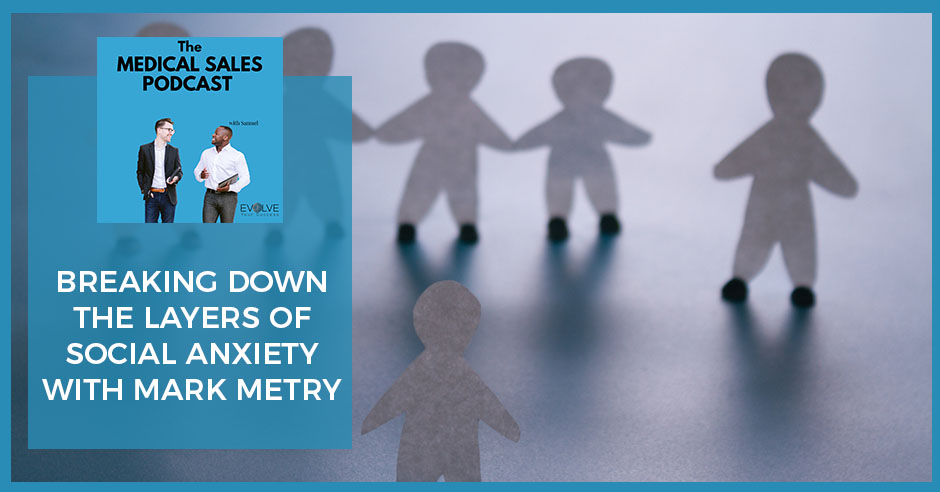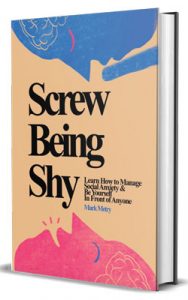
On the last episode of our three-part series with Mark Metry, he breaks down the four layers of social anxiety. A better understanding of the complexities of social anxiety only equips you with better skills to deal with it. For today, Mark joins Samuel Gbadebo to share useful tips and strategies he himself has used, including exposure therapy. Listen in and start to identify the layers and areas you need to work on to get past the shyness and change how you interact with others.
—
Watch the episode here
Listen to the podcast here
Breaking Down The Layers Of Social Anxiety With Mark Metry
This is going to be the last part of the interview with Mark Metry. In this part of the interview, we get into some tools to use getting around anxiety, especially as a sales professional. This is something that can be utilized by anyone, especially in medical sales, where you have that one office that’s not receptive to you. That one account that you do not like to go into, or you get a new hospital or a new surgery center and they don’t like reps at all.
They breathe this feeling of, “We do not want to see you.” You still have to get in there, develop the relationships, make them want to respond to you, receive you, provide value, consistently make the sale, and then network more relationships to make more sales. That’s the name of the game. If you develop a little bit of anxiety or run any of it, then it can be debilitating as you try to make things happen in your career.
Mark is going to bring us home in this last part of the interview some tools to use that we should all read and take heed to because anyone can experience this. You don’t have to be an introvert. Extroverts go through this, too. Anyone can get to a situation where it’s awkward, strange or a little bit too different and you are not sure what to do. You find yourself falling short and you are hoping to call or rely on something that you learned in the past but you don’t have it. Here it is. As always, thank you for reading the show. I hope you enjoy this last segment with Mark Metry and here is the interview.
—
That is fascinating, Mark. You did explain the different intuition. As you said, it seems like at the end of the day, meditation can help you build that muscle so you can notice your intuition and start to utilize it, and not let your anxiety hijack what is supposed to be there. I want to take it back to those four levels. Go ahead and explain those four levels of social anxiety.
The reason why I referenced meditation is that for me, I have gone through my own anecdotal story but I always like to look at science because I believe that science can tell us a lot of information that works for a lot of people. In terms of my research on science in terms of social anxiety, meditation always pops up again and again. It’s one of those things, where it’s not a fad, gimmick, secret, cheat code or whatever. It’s something that has been verified by science on a wide variety of issues.
In terms of the layers of social anxiety, there are four layers of social anxiety. People who have social anxiety usually have one but it’s usually a combination of all of the layers. It depends on the person and I can give examples after I talk about the four layers. Number one, people will get socially anxious around their physical appearance. Number two, people will get socially anxious around their social skills. They feel like they don’t know how to talk to someone or have a conversation. Number three, people will get socially anxious around the signs of anxiety itself.
What that means is you are in a conversation, and then all of a sudden, you start to blush, sweat or stutter. A part of your brain is like, “They think I’m nervous.” There will be another layer of anxiety that will start to get anxious because you look like you are anxious. It’s like this feedback loop from hell that never ends. The last one is people will be socially anxious about their entire personality and who they are as a person, which usually happens if you have had social anxiety for a while.

In terms of the first one, your physical appearance, I grew up for the most part in Massachusetts in a small town that had no racial diversity. I was the only person and maybe a couple of other people in the entire town who looked physically different than everybody else. Plus, you tack on some bullying and discrimination. What I learned is that there is a part of my social anxiety that was formed because I didn’t look like anybody around me when I was growing up. Whenever I walked into a room, my brain would always tell me, “You are different. You are the odd one out.” It’s all these things.
I also grew up in a small town. It was a pretty affluent town but my family was not affluent. I remember growing up and wearing the same clothes to school again and again. While this kid had Jordans on or whatever, I would wear the same clothes to school, and then people would make fun of me for wearing the same clothes to school. They would also make fun of my family and how much money my family would make. For me, I built up this layer of social anxiety around my clothes and skin color.
Also, I wasn’t necessarily obese or anything growing up but I was not fit. There was always a part of me that was anxious because I felt like I wasn’t good enough in terms of my body size. When I was about eighteen, I did become obese, where I gained over 100 pounds and went through this whole process. I have this physical appearance layer of social anxiety in terms of my skin color, clothes and weight. The same hold is true. If you go down in all these different layers, people will have all these different subsections within these layers.
For example, what you can start to do is if you identify that you have this and what we call exposure therapy. I have to give a disclaimer here. If you have social anxiety and you have never done anything to deal with social anxiety before, I highly do not recommend going into exposure therapy first because if you do, you will probably not get good results, which is then going to reaffirm the whole cycle that I told you about of like, “Why am I like this? I’m a terrible person.” It makes things worse. It’s very depressing.
[bctt tweet=”If you have social anxiety and you’ve never done anything to deal with social anxiety do not go into exposure therapy first.” username=””]
I only recommend people doing this who have started meditating. Maybe you have seen professional help, where you started working with some kind of a coach or someone who has knowledge in this area or you started to work on some of these habits that I have mentioned over months, then you can start to do exposure therapy. That will work much better. One of the things that I would do, for example, to expose myself to the fear of social anxiety of the physical appearance of my clothes is I would go to the most populated public area I could find, which was like my mall.
What I would do is go to the mall and wear the most ridiculous-looking clothes on purpose. I would wear a pink cowboy hat, a pink neon shirt, and tight shorts that were all flowery. I wear a lot of pink clothes. Pink is one of my favorite colors. The point of this is that you are entering this environment where you are purposely putting your brain in the situation, where a lot of people are going to look at your clothes. They may laugh and give you weird looks.
What you are doing is that people with social anxiety think that this is happening to them all the time. They think that people are always looking at them and laughing at them. When you step into this new environment where people are making fun of you and laughing at you, what starts to happen is you start to de-condition your brain from this fear. For example, I don’t have any anxiety anymore around my physical appearance, social skills or any of these things because I have done this time and time again.
For example, when it comes to your social skills, one of the things that I would do is try to challenge myself to talk to strangers. At first, when I did this, I couldn’t do it. I would be walking on the street. If I see someone walking towards me, I would be like, “Mark, talk to them. Say this and that.” I would get close and the next thing I knew, my brain and nervous system would hold me back and I couldn’t do it. That’s where I had to pause and start meditating. I had to start working on my brain’s neurotransmitters.

What I did was I went back into exposure therapy and challenged myself to talk to strangers. What I did was I made it logical. For me, what I realized is that if I set myself a challenge of like, “Talk to someone,” it’s open-ended and broad. There are a lot of chances of rejection and risk of failure. What I started to do was ask other people specific questions. For example, I would pull out my journal and write down, “Mark, go outside and try to ask five random people what time it is.”
I would go outside and ask someone like, “Excuse me. I’m so sorry to bother you. Do you mind having a time by chance? I forgot my phone.” They would be like, “Yes, sure. It’s 6:55.” What happens is you do this again and again, and then you increase the challenge a little bit. You say, “I’m going to walk up to five people and ask them what the time is. I’m also going to ask them if they know directions to go to a certain place.”
You do the last one and then you are like, “I’m going to ask them what time it is and directions to get somewhere, and then I’m going to try to leave them a compliment.” That’s more than a thank you. What you do is you put yourself in these situations. For a lot of people reading this, whether it’s in their past or even recently where they have been rejected. Where people have made fun of their clothes, their physical appearance, how they talk to people or feel like they have no social skills, you start to incrementally put yourself in these certain situations.
What’s happening in the background is that your brain is slowly learning like, “I can talk to people and they are not going to hate me.” There’s always going to be that 1 or 2 exceptions. It depends what neighborhood you are in and certain things like that but for the most part, people can do this thing. It’s called exposure therapy. They can do it with a professional or by themselves. I recommend people to do this once they have done some other things to manage social anxiety before they put themselves in this situation.
[bctt tweet=”You have to do deep work within yourself. That has to do with managing your mental health, emotional health, dealing with things you don’t even want to talk about, talking about the truth of your reality, talking about your purpose.” username=””]
If you haven’t done anything to manage or deal with your social anxiety at a healthy level, then if you put yourself in those situations of exposure therapy, you are probably not going to be so successful. That’s going to send the opposite message to your brain, which could be quite damaging. This is a disclaimer. Those are the four layers of anxiety. That’s how people can start to expose themselves to that to de-condition their brain to the layers.
We are going to come to a close. One thing I want to ask you, though, a lot of people are reading this and people are going to recognize, “I might not have social anxiety now but I had it at some point and I might even still be working through it.” Some people might even say, “I have experienced an event that caused me to experience some of these things that Mark touched on.” What is a blanket message that anybody can relate to that you would like to leave with the audience around this topic, remaining effective in their roles as sales professionals?
I remember before COVID, I’ve got the chance to sit down and interview on my podcast this guy named Jay Shetty. He is very well-known and he has this common saying that’s like, “If you feel like you can’t go farther in life, like no matter how much effort you are putting in, you are experiencing the same reality, that’s a sign that you need to pause and dig deeper in yourself.”
For me, what I learned is that when I was eighteen, I had a lot of social anxiety. For example, I was making six figures at that time. I had all of these different kinds of online businesses. I was still pretty successful. I was successful on paper. I had a family that respected me but, on the inside, I was in so much pain and problem.

What I realized is that our world tells us, “If you want to be happy, then put in much effort at your job and get promoted, you can make more money so that your family is happier. If you want to feel better, then go to the bar with your friends and get hammered.” All those things are great. I’m not here to discredit or discount any of those things. However, if your brain hasn’t been acknowledged like if you are neglecting your capacity for your mental health and if you have never thought about these things, then a lot of times, making that extra $50,000 or getting hammered on an extra night is not going to do anything for you.
You have to do deep work within yourself. That has to do with managing your mental health and emotional health. It’s dealing with things that you don’t even want to necessarily talk about. It’s talking about the truth of your reality and purpose. That for me is something that is very powerful because a lot of people are reaching this level in their life where they are not fulfilled. They are always tired. The things that used to bring them happiness and joy don’t bring them anymore.
What I’m here to say is, “Maybe that doesn’t have to do with what you are doing at your job or with your family. Maybe that has to do with what is happening on the inside.” For so many of us, we haven’t been told that. There are many different reasons for this. The world’s most successful people that I have ever met all know this to be true of like, “You’ve got to figure it out on the inside first.” I feel like people at the top would rather keep that idea to themselves because if they did, then maybe people wouldn’t work as hard to get different zeros in their bank account.
There’s nothing wrong with making money, putting in a lot of effort at your job or going to the bar, and getting some drinks with your friends. There’s nothing wrong with any of those things at all. If that’s your only source of self-development and feeling happy for your life, then that’s not a sustainable track and maybe you need to dig in on the inside to the root cause. I know for me personally, anytime in my life where I feel like, “I’m putting in so much effort but nothing is changing. I’m not getting results,” then I pause and dig deeper down in myself.
I take whatever is deep down there, bring it into my life and integrate it. I always reach the next level of success. It always happens. That’s the message that I would leave behind for your audience of like, “Sometimes if you are trying to do stuff or hustle on the outside but you are not seeing results, it’s a sign that you need to pause, hustle on the inside and dig deeper down for yourself.”
It’s beautifully said, Mark. This was a great experience. I’m so glad you are on the show. Thank you for joining us. I’m going to get people to read this book that you wrote because it’s going to provide incredible value for them. Can you give us the name of that book again?
It’s called Screw Being Shy. It’s also an audiobook on Audible too if you don’t want to read it. Samuel, thank you so much for hosting this. If anyone wants to reach out to me for whatever reason, I always try my best to be very open. If anyone has any questions or anything like that, feel free to reach out to me. Thank you so much to everyone out there reading. This was awesome.
Mark, we are looking forward to hearing more from you. Take care.
—
That was Mark Metry. If you read this entire series, parts 1, 2, and 3, then you’ve got a good picture of what it means to have social anxiety. I wouldn’t be surprised if you were to share with me that you have experienced it at some point or another, or you might even be dealing with it now. I hope that you are ready to get some tools that you can apply, utilize, and have you show up differently any time you feel like you are developing anxiety. Whether you are about to have a customer interaction or in the middle of customer interaction, this can help you follow that through and come out on the other side being successful in that customer interaction.
If you are reading this and thinking, “I want to know more about what Mark Metry is doing,” you can check it out on iTunes or Spotify. You can even go to our website, EvolveYourSuccess.com. Go to the show page and look up his episode. He is also on YouTube. He has a TEDx Talk. He has a pretty significant following on LinkedIn as well. It’s over 100,000 followers. He is making things happen.
He is bringing a lot of awareness to social anxiety and to every type of profession, even sales, where people assume that it’s not there, only to see that it is very much there. He is bringing tools, resources, and ways to get through social anxiety to be more effective, perform better, and have that peace with yourself no matter what situation you go into or you are thrown into.
Another person that I want to mention that we have talked about on the show before, and you might have even heard his episode is Chris Larsen. He wrote a book called Next-Level Income. He is interesting because he was in the medical sales space. He was making over $300,000 a year. He walked away from all of it to throw himself full-time into his lifelong passion of real estate investing. Financial freedom was always a goal for Chris and he finally found a way to create it.
Now, what he only wants to do is dedicate his life to helping other people do the same. Ultimately, what made him want to make that initial transition was he wanted to spend more time with his family and kids, buckle down and focus on his goals of creating financial freedom for other people. If you would like to learn more about his secrets on how he became financially independent and how you can become financially independent as well, then you’ve got to get a copy of his book, Next-Level Income. You can get a copy at NextLevelIncome.com/book.
What he is doing is truly helping people become financially independent. In his book, you are going to learn so much. I have learned much when I read it. One of the things I love is that it’s such an easy read. It’s one of those simple weekends reads that’s packed full of information. You are going to walk away saying, “The things that I didn’t know.” Everyone is onboard. Doctors, medical sales executives, and medical sales reps are onboard. I’m onboard and it’s all because we see the value in what he is doing, and he is helping all of us become financially free.
I’m not making stuff up. These numbers and investments are real. When you see it work and happen, the dream of you being financially free will quickly become real. Why wouldn’t you want to be a part of that? If you have money to invest and you want to put it into action, then you’ve got to do it with Chris Larsen. You know what we do here at Evolve Your Success. Me, Samuel, you know our program and what it entails.
We also have a program that helps you get into medical sales. That program is called the Medical Sales Career Builder. Those of you who have been reading or listening has been hearing me talk about this. You might have seen me on LinkedIn. You might have seen us at EvolveYourSuccess.com. You might have heard our guests talking about it.
If it’s something that you know you want to get into the industry, it doesn’t matter if it’s medical device, pharmaceutical, biotech or capital equipment sales. If it has anything to do with you wanting to be a part of that industry or even you wanting to know more so that you can entertain being a part of that industry, then you need to reach out to us at EvolveYourSuccess.com and select Attain Medical Sales Role. You are going to be prompted to fill out a short application, get some information about what you are trying to do, and schedule a call with us. Let’s have a good conversation about what you are trying to do, where you are trying to go, and how we will help you get there.
Another program that we have that I want to talk about is our LinkedIn Branding Program. Everyone has noticed it by now. LinkedIn is no longer just the, “I want to get a job” site. It’s still one of the best ones but it has gone so much further than that. Now, you can be that sales professional. You can completely enterprise yourself on that platform, get access to customers and make sales that you might not have been able to make otherwise. That’s the environment, the LinkedIn space has created and we have learned how to do it when it comes to medical sales.
Maybe you are even thinking of, “I want to get more business through LinkedIn but I want to be a brand. I want to create myself as a thought leader because I have much to offer in the space that I work in. I have so much to share but honestly, I have no idea how to do it.” If this is you, go to EvolveYourSuccess.com and select Improve Sales Performance or go to the top menu and select LinkedIn Branding. Schedule some time with us and let’s have a conversation about a program that can change your life.
We have worked with people that have gone from 1 role to 2 roles hired, that have gone from small enterprises to significantly larger enterprises. That has gone from, “I can’t find sales. I have been going at this for four months now,” to, “I have a consistent business not more than three months later.” These things are real. These things happen and they can happen on this platform. We will show you how to make that happen. Take a look at these programs.
We thank you so much for taking the time to read the blog. As always, we will look for more innovative ways to bring you guests that will bring you value and insight into how to get into medical sales, perform within medical sales and lead the way in medical sales. We hope to see you in the next episode.
There is one more thing I want to say. This was one heck of a year. There are so many things that happened. There are so many things that we wanted to see and a few things that we did not want to see but it made for one heck of a year. For those that are reading this now, you made it and you are about to have an even more amazing year coming in with 2022. Have yourselves a very Merry Christmas and a Happy New Year.
Important Links:
- Mark Metry
- Podcast – Humans 2.0 With Mark Metry Past Episode
- Screw Being Shy
- Audible – Screw Being Shy
- iTunes – The Medical Sales Podcast
- Spotify – The Medical Sales Podcast
- Chris Larsen – Previous episode
- Attain Medical Sales Role
- Improve Sales Performance
- YouTube – Mark Metry
- TEDx Talk – The Invisible Mental Health Epidemic Stopping People from Being Themselves
- LinkedIn – Mark Metry
- NextLevelIncome.com/book
- Medical Sales Career Builder
- LinkedIn – Samuel Adeyinka
- LinkedIn Branding Program
- https://www.instagram.com/markmetry/
About Mark Metry
 Mark Metry is a 24 year old entrepreneur, author, creator, mental health advocate, coach, teacher, keynote speaker, podcast host, and loving human being.
Mark Metry is a 24 year old entrepreneur, author, creator, mental health advocate, coach, teacher, keynote speaker, podcast host, and loving human being.
Mark has interviewed over 300+ top leaders around the world from billionaire philanthropists, to neuroscientists, professional athletes, New York times bestselling authors, philosophers, and innovative disrupter’s on his Top 100 Humans 2.0 podcast, which NASDAQ, and Yahoo Finance placed in the “Top 21 Growing Podcasts you must listen to..”
Now, Mark hosts the Social Anxiety Society podcast, and is the bestselling author of Screw Being Shy: Learn How to Manage Social Anxiety and Be Yourself in Front of Anyone!
Mark has been featured in Forbes, TEDx, HuffPost, Mindvalley, Inc and many more. Mark‘s been mentioned alongside Elon Musk and Jeff Bezos and can be found speaking at Universities like Rutgers to Nonprofits like Coptic Orphans, to conferences and high schools across the nation.
Mark has spoken alongside Olympian Athletes, New York Times Bestselling authors, and Fortune 500 CEO’s.
Mark’s story has been featured in 3 books, including Ditch the Act by McGraw Hill, Standing O! alongside Billionaires and other mavericks, and We’re All Marketers. Mark has also been a guest on over 250+ podcasts, radio stations, and television.
Additionally, Mark advises startups, and volunteers his time as an advisory board member at an education based nonprofit.



















































































